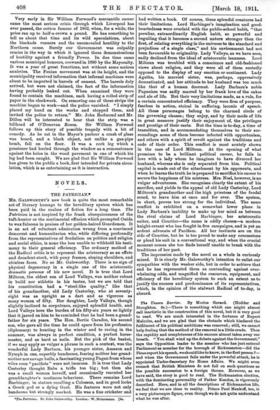NOVELS.
THE PATRICIAN.* GLLSWORTHY'S new book is quite the most remarkable act of literary homage to the hereditary system which has been paid in the realms of fiction for a long time. The Patrician is not inspired by the frank obsequiousness of the tuft-hunter or the sentimental effusion which prompted Onida to wax fulsome in praises of her golden-haired Guardsmen. It is an act of reluctant admiration wrung from a convinced democrat and humanitarian who, while differing profoundly from the representatives of feudalism on politics and religion and social ethics, is none the less unable to withhold his testi- mony to their general efficiency. The ordinary method of the Radical critic is to represent the aristocracy as an effete and decadent stock, with puny frames, sloping shoulders, and chinless faces. No so Mr. Galsworthy. There is no sign of physical degeneracy in a single one of the aristocratic dramatis persona of his new novel. It is true that Lord Miltoun, the eldest eon of Lord Valleys, was neither robust in build nor athletic in his tastes, but we are told that his constitution had a " steel-like quality," like that of his grandmother, old Lady Casterley, who at seventy- eight was as upright as a dart and as vigorous as many women of fifty. Her daughter, Lady Valleys, though slightly inclined to corpulence, enjoyed splendid health, and Lord Valleys bore the burden of his fifty-six years so lightly that it jarred on him to be reminded that he had been a grand- father for six years. The Hon. Bertie Caradoc, his second son, who gave all the time he could spare from his profession (diplomacy) to hunting in the winter and to racing in the summer, was always in perfect condition, a perfect horse- master, and as hard as nails. But the pick of the basket, if we may apply so vulgar a phrase in such a context, was the wonderful Lady Barbara, his younger sister, Amazon and Nymph in one, superbly handsome, fearing neither her grand- mother nor savage bulls, a fascinating young Pagan from whose wiles even " pacifists " were not immune. It is true that Lady Casterley thought Babe a trifle too big ; but then she was a small woman herself, and occasionally resented her granddaughter's mutinous behaviour. There remains Lord Harbinger, in stature recalling a Colossus, and in good looks a Greek god or a dying Gaul. His features were not only handsome but strongly marked. He was a fine cricketer and
• Ths Patrician. By John Galsworthy. London: W. Heinemann. [6s.
had written a book. Of course, these splendid creatures had their limitations. Lord Harbinger's imagination and good- heartedness were overlaid with the public-school habit, "that peculiar, extraordinarily English habit, so powerful and beguiling that it becomes a second nature stronger than the first, of relating everything in the universe to the standard and prejudices of a single class," and his environment had not been favourable to originality. Lady Valleys, as we have seen, sadly declined from the ideal of aristocratic leanness. Lord Miltoun was troubled with a conscience and old-fashioned views about religion, and they were all of them rootedly opposed to the display of any emotion or sentiment. Lady Agatha, his married sister, was, perhaps, oppressively domesticated, and her attitude to her husband was too much like that of a human doormat. Lady Barbara's noble Paganism was sadly marred by her frank love of the cakes and ale of life. But their very limitations made, as a rule, for a certain concentrated efficiency. They were firm of purpose, fearless in action, stoical in suffering, laconic of speech. All these personages belong to the charmed circle of the governing classes ; they enjoy, and by their mode of life in great measure justify their enjoyment of, the privileges and prestige of their caste. But the time is to-day, a time of transition, and in accommodating themselves to their sur- roundings some of them become infected with opportunism, and others with a spirit of revolt against the traditions and code of their order. This conflict is most acutely shown in the case of Lord Miltoun. At the opening of what promises to be a brilliant political career, he falls in love with a lady whom he imagines to have divorced her husband, whereas she is only separated from him. Political capital is made out of the attachment by his opponents, and when be learns the truth he is prepared to sacrifice his career to secure the happiness of his mistress. Mrs. Noel, however, is no vulgar adventuress. She recognises clearly the extent of his sacrifice, and yields to the appeal of old Lady Casterley, Lord Miltovn's grandmother and the high priestess of the feudal creed, to leave him at once and for ever. The system, in short, proves too strong for the individual. The same conflict is exhibited on a somewhat lower plane in Lady Barbara's inability to make up her mind as between the rival claims of Lord Harbinger, her aristocratic suitor, and Courtier—the name is oddly chosen—a modern knight-errant who has fought in five campaigns, and is yet an ardent advocate of Pacifism. All her instincts are on the side of Courtier, but he is too proud to make any concessions or plead his suit in a conventional way, and when the crucial moment comes she too finds herself unable to break with the traditions of her past.
The impression made by the novel as a whole is curiously mixed. It is clearly Mr. Galswortby's intention to enlist our sympathies with the weaker side, but in order to achieve that end he has represented them as contending against over- whelming odds, and magnified the resources, equipment, and efficiency of the hereditary system to such an extent as to justify the success and predominance of its representatives, which, in the opinion of the stalwart Radical of to-day, is absurd.










































 Previous page
Previous page